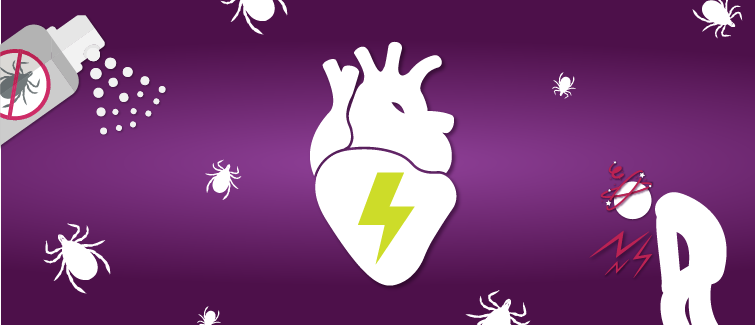As the weather warms, you may hear about more cases of Lyme disease. This condition, which spreads through tick bites, can cause a wide range of symptoms and even affect your heart if left untreated.
When Lyme bacteria reach your heart tissue, it can cause Lyme carditis, which affects your heart’s electrical system. Learn more about this condition.

Home Treatment for Stings and Insect Bites
Never Miss a Beat!
Subscribe to Our HealthBeat Newsletter!
Thank you for subscribing!
You can now select the specific newsletters you'd like to receive.
You are already subscribed.
Subscribe to more newsletters in our email preference center.
Sorry, an error occurred. Please try again later.
Get Healthy Tips Sent to Your Phone!
What Is Lyme Disease?
Lyme disease is a bacterial infection that spreads through tick bites. Not all ticks carry Lyme disease. Black-legged ticks, also called deer ticks, are carriers of the disease.
These ticks are often found in wooded, grassy areas in the New England, mid-Atlantic, and upper Midwest areas of the United States.
If an infected tick bites a person or animal, the infection passes from the tick into that body. Early symptoms of Lyme disease can appear within a few days of a tick bite. In most cases, the first sign is a red rash that can look like a bull’s eye. Other early symptoms can include:
According to the Centers for Disease Control and Prevention, if a tick is attached to your skin for fewer than 24 hours, your chance of getting Lyme disease is low. If you find a tick on your body, carefully remove it using these tips. If you develop symptoms, contact your doctor right away.
Is Lyme Disease Treatable?
In most cases, Lyme disease can be successfully treated with antibiotics when caught early. If left untreated, Lyme disease can cause more serious problems that affect your joints, nervous system, and heart.
How Does Lyme Disease Affect the Heart? Learn More About Lyme Carditis
When Lyme bacteria reach your heart tissue, it can cause Lyme carditis, which affects your heart’s electrical system.
Lyme carditis can lead to another condition called heart block, which happens when your heart beats too slowly. There are three types of heart block:
- First-degree heart block: when the electrical signals reach the bottom chambers of your heart, called your ventricles, slower than usual.
- Second-degree heart block: when the electrical signals either fail to reach the ventricles fully, or some of the signals cannot reach them at all.
- Third-degree heart block: when none of the electrical signals can reach your ventricles.
Symptoms of Lyme carditis can include:
- Dizziness or light-headedness
- Fainting
- Shortness of breath
- Chest pains
Lyme carditis can be treated, usually through antibiotics. Some patients may also need a temporary pacemaker to keep the heart beating at a normal rate.
How Can I Prevent Tick Bites?
To prevent tick bites, you can:
- Stick to the center of walking paths or hiking trails, away from brush
- Use tick repellent on your skin and clothing
- Bathe or shower as soon as you can once indoors
- Conduct a full-body check to spot ticks on your skin and in your hair
- Check your gear and pets for ticks
To learn more about treatments for Lyme carditis, contact the UPMC Heart and Vascular Institute, or call 1-855-UPMC-HVI (876-2484).
About Heart and Vascular Institute
The UPMC Heart and Vascular Institute has long been a leader in cardiovascular care, with a rich history in clinical research and innovation. As one of the first heart transplant centers in the country and as the developer of one of the first heart-assist devices, UPMC has contributed to advancing the field of cardiovascular medicine. We strive to provide the most advanced, cutting-edge care for our patients, treating both common and complex conditions. We also offer services that seek to improve the health of our communities, including heart screenings, free clinics, and heart health education. Find an expert near you.
